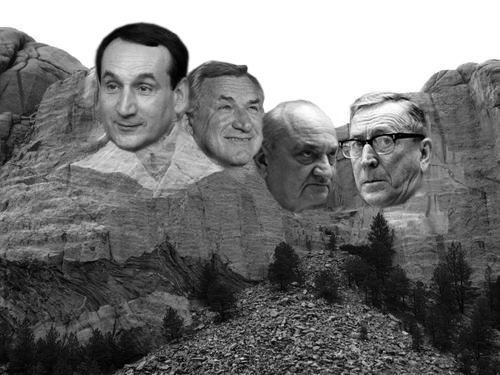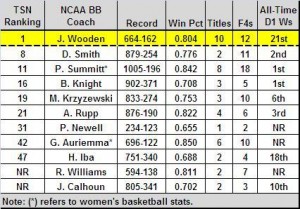RTC’s Mount Rushmore – Top Four (And More) Most Significant People in College Basketball History
Posted by EJacoby on February 20th, 2012Evan Jacoby is a regular contributor for RTC. You can find him @evanjacoby on Twitter.
As we celebrate President’s Day on this Monday, it’s a good time to reflect back on the significant accomplishments of George Washington and the other great leaders of our country’s 236-year history. That got us to thinking: Who are the most significant people in the history of college basketball? The game is not quite as old as the United States of America, but there are many options to choose from in a sport that’s over 100 years old, from prodigious coaches to superstar players. In the end, we determined that no single player, in a maximum of four years of eligibility, has had as much impact on the sport as any of the four coaching legends that we selected. Head coaches are responsible for shaping the lives of hundreds of players during their tenure and thus have a greater opportunity to impact the game than anyone else. Here’s a look at the accomplishments of four of the all-time great coaches in college basketball history that compose our RTC Mount Rushmore (these are in no particular order):
Mike Krzyzewski – You may not be able to spell or pronounce his full last name, but ‘Coach K’ is one of the first names that comes to mind when discussing the greatest coaches in basketball history. Krzyzewski became the all-time winningest Division I men’s basketball coach when he recorded his 903rd victory to surpass his former coach at Army, Bobby Knight, earlier this season. Coach K has been at Duke since 1980 and has led the Blue Devils to four National Championships, 11 Final Fours, and 12 ACC regular season titles. He also coached the USA Olympic ‘Redeem Team’ in 2008 to a gold medal. Mike Krzyzewski was elected to the Basketball Hall of Fame in 2001, still remains the head coach of one of the top contenders in the country every year, and doesn’t appear to be calling it quits anytime soon.
Adolph Rupp – A man known for his obsession with winning, Adolph Rupp is perhaps the single most successful head coach in NCAA history, statistically speaking. Rupp is fifth on the all-time men’s coaching wins list (876 victories), and he did it with the second-best winning percentage of all time, at 82.2%. Rupp spent his entire 41-year coaching career at Kentucky, where he guided the Wildcats to six Final Fours and four National Championships. His tournament records could have been even more impressive if it wasn’t for his team’s two-year hiatus from the postseason in the 1952-53 and 1953-54 seasons. Rupp also led UK to 27 SEC regular season titles in 41 years and was elected to the Basketball Hall of Fame while still coaching in 1969. Shortly after he retired, Big Blue Nation named their home court after him, and Rupp Arena remains one of the historic landmarks in college basketball today.












































